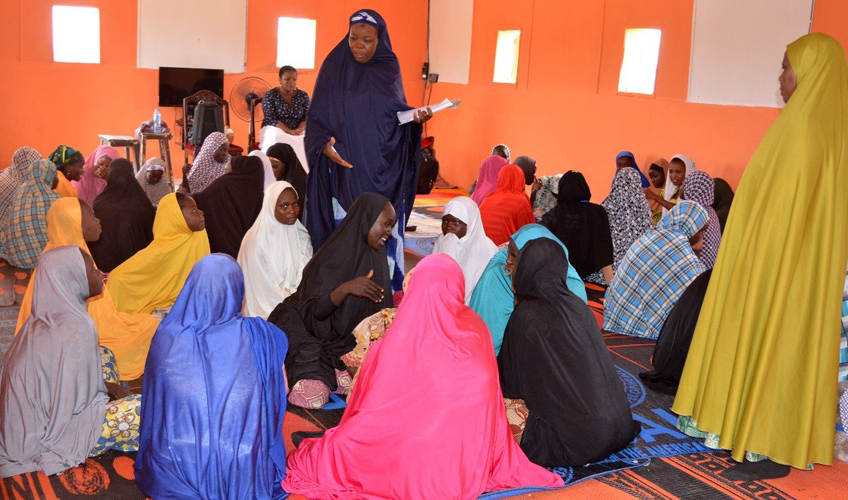Moving forward together: Zara's story
Zara* fled her home to avoid being captured by Boko Haram. At a displaced persons camp, she has become a community leader, supporting women facing stigma and rejection.

A year and a half ago, Zara left her home in Gwoza, Nigeria to avoid Boko Haram captivity. As she made her way to an internally displaced persons (IDP) camp in Mubi, Maiduguri, she was separated from all eight of her children.
The camp was subsequently closed and Zara was moved to the Arabic Teachers College IDP camp and then finally to the Bakassi IDP camp a year ago, where luckily she was reunited with her children.
Although Zara was not sexually assaulted by Boko Haram, the fear of being a target simply for being a woman and the need to escape to survive still left a lasting impact on her life.
I was a bit traumatised. I am a widow with 8 children without any support or comfort.
Rather than giving up, Zara’s experiences compelled her to help the other women in the camp, especially those who had been sexually assaulted by Boko Haram.
“I am now accommodating one sexual and gender-based violence survivor who does not have a family network in the camp,” Zara tells us.
It was due to this commitment that she was identified as an influential leader by our local partners, the Federation of Muslim Women’s Associations in Nigeria and the Herwa Community Development Initiative.
As a result, Zara was trained in how to run workshops for victims of gender-based violence and now leads peer-to-peer sessions for newly-arrived women and girls at Bakassi IDP camp.
The workshops have been useful in helping women and girls recover from the trauma brought about by their experiences during captivity. Zara tells us that the workshops and community dialogues we run with our partners help to build trust in the community, and reduce stigma against women and girls.
There is stigma. It is very evident. Even within the camp, there is not much cooperation among newly-arrived survivors and displaced persons already in the camp, because there is a sense of mistrust. However, the workshops are helping to keep the situation calm.
Zara recalls the story of a woman who was rejected by her parents after returning from captivity. She was brought to the IDP camp, where she participated in one of the workshops. Due to the things she learned there, particularly about coping with trauma, the woman asked Zara to help reunite her with her parents.
Together with the Civilian Joint Task Force, which serves as a community policing force in the three states most affected by the violent conflict in northeast Nigeria, Zara managed to talk to the family and not only got them to truly understand the ordeal the young woman went through, but also accept her back into the family again.
Zara was able to provide this support because she has been serving as a community leader and is using her influence, at the community level, to reduce stigma and increase social cohesion.
Not only has she been helping by running peer-to-peer sessions, but has gone further and agreed to take in an 18-year-old girl who attended one of the workshops. The girl had been rejected by her family as a ‘Boko Haram baby’. She is also currently hosting a 12-year-old child who is yet to locate her family.
Zara believes that there is still more to be done considering that survivors are arriving at the camp every day.
The programme is helping, but if reintegration is to become a success, the situation requires economic stimulation.
About the project
Supporting vulnerable communities and conflict-sensitive reintegration in northeast Nigeria was a project to help reintegrate survivors of sexual violence by Boko Haram as well as support people internally displaced by the conflict.
International Alert Nigeria worked in three camps for internally displaced people and one host community in Maiduguri, and another community in nearby Bama, to help those affected by the violence reintegrate back into society and move forward with their lives.
This included holding victim support and family dialogue sessions – especially women, girls and children, running public awareness campaigns on stigma reduction, and training local leaders on peacebuilding and non-violent conflict resolution.
*Name changed to protect identity.






